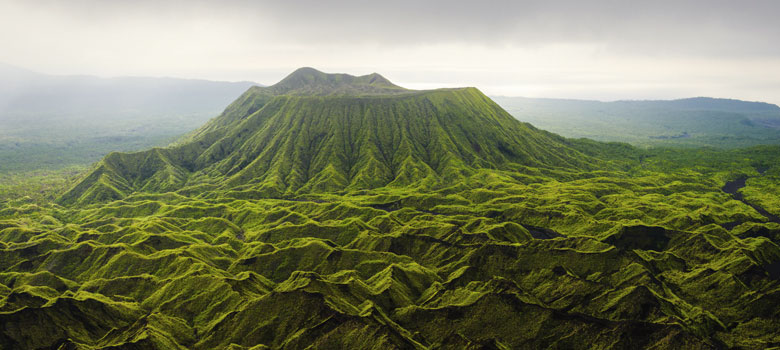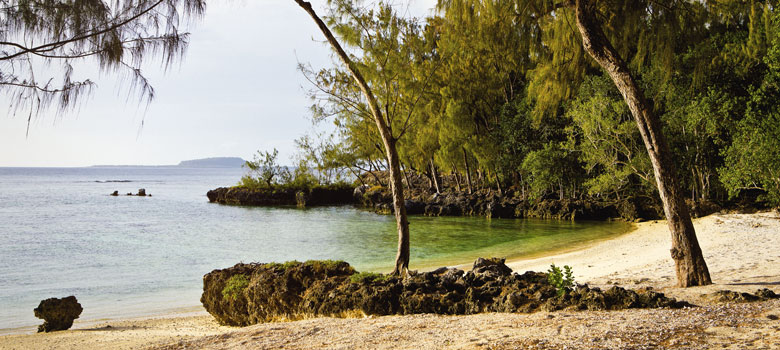
Life
Vanuatu Eco Escape
When the borders reopen, a stay at Vanuatu’s first luxury agro-tourism resort will provide a panacea for first world burnout.
Resort accommodation is hardly a new concept in Vanuatu. You can find them all over the volcanic archipelago, particularly on Efate and on Espiritu Santo, where divers come from afar to drift over Second World War shipwrecks.
But of the hundreds of resorts of varying budgets around this South Pacific paradise, only one slots into the luxury agro-tourism category.
The Palm House opened its doors to guests on a 3800-hectare organic farm near Efate Island’s most westerly point in June 2019. Formerly a private holiday house, the owners tinkered with the original structure to create four two-person villas either side of a communal living and dining space.
Furnishings and colourings were altered so they now reflect a breezy, colonial style, with the addition of subtle nods to island cultures and traditions. As part of their commitment to preserving the land, the property is run solely on wind and solar power.
Left: The Palm House guest villas; Right: The Palm House breakfast spread
Though it’s just a 45-minute drive from Port Vila, the resort is the antithesis of Vanuatu’s capital and largest city. That rare sensation of entering a private sanctuary that can, should you wish, be savoured all to oneself begins the moment you pass through the property gates.
After passing herds of prime beef cattle, sheep and goats down a 12-kilometre-long crushed coral driveway, you’ll arrive at the resort, resting in a clearing that slopes gently down to a sandy shoreline shadowed by Norfolk pine, she-oak and Moreton Bay fig trees and fringed by coral reefs that quite literally teem with sea life.
Each villa can be hired individually or collectively for groups. They contain ensuite bathrooms, outdoor showers and private verandas. Fittings include Smeg mini-bar fridges and Bluetooth turntables, with complimentary Wifi. Custom-made rattan cots and hand-made quilts for little ones are available upon request.
Sounds lovely, doesn’t it? But all this beauty and solitude came at a price for resort managers, Portuguese couple Miguel Coelho and Carolina Caldas.
“It took us an hour and a half to drive into town for supplies every day before they laid the driveway,” says Coelho. “Now, at least, it only takes half that time.”
REWARD FOR EFFORT
On my first morning, after stocking up from a breakfast platter filled with tropical fruits, sweet and savoury croissants and muesli, and coffee sourced from the farm’s own plantation, Thomas Monvoisin knocks on my door ahead of a guided tour around the island.
Since 2016, when he took over the financial reins from his father Robert, Thomas has acted as General Manager of the Teouma Group, the family-owned conglomerate whose business portfolio includes beef and prawn farms, a steelworks factory, a coconut oil refinery and a kava plantation among
its interests.
“My father is a farmer. Bookkeeping is not his strength,” says Thomas.
Left: Teouma Group General Manager Thomas Monvoisin; Left: Miguel Coelho and Carolina Caldas
Robert moved to Vanuatu from New Caledonia, where he had lived for 24 years, in 1984. “It was a good time to invest,” explains Thomas. “Land was cheap because it was just after independence in 1980.”
It proved to be a prudent decision. The entrepreneurial Monvoisins now rank as one of Vanuatu’s most prominent business families. The country’s economy has also benefited via the Teouma Group’s employment of hundreds of Ni-Vans.
“Only 10 of our 400 employees are expats,” says Thomas. “The rest are locals.”
The Palm House is the family’s first foray into hospitality. But beef exports are where they have made their fortune.
“We’ve probably got 18000 or 20000 head of beef all up,” says Thomas, who lists eight separate farms on two islands where their cattle graze on pesticide-free grasslands, including around 2000 head of cattle on Tukutuk Farm on which the resort is located.
We travel south through Port Vila to La Cressonnière, the farm where Thomas is keen for me to see their elite herds of grass-fed Droughtmaster and Angus breeds. Fattened up for slaughter in the only abattoir in Vanuatu (which the family owns in partnership with the government), they are then exported to neighbouring Pacific nations and even as far as Japan. Fortunately, for guests at least, they also make it onto the menu at The Palm House.
PADDOCK TO PLATE
With just two nights at the resort, my stay is more rushed than it deserves to be. I’d love to while away the hours doing little more than reading novels beside the swimming pool or by lazing on one of two private beaches immediately out the front of my villa.
Normally I’d be utilising the water sports equipment that comes included as part of my stay, but they remain unused this time. Boat tours to neighbouring islands could also have been arranged.
One thing I do find time for is a swim in the ocean. After following a shady pathway to a tidal pool further along the coast, I strip down to my bathers then swim around for a while on my own, just as the sun is setting. Back at the villas, I meet a couple who have just arrived for a weeklong holiday from Auckland.

Above: Private beach at The Palm House
They’re the only other guests staying at the resort and they tell me they plan on doing very little all week. For that, I tell them they’ve picked the perfect place.
“Oh, we know. We did our research,” he says.
We chat that evening over dinners prepared by Caldas and Coelho, who say their style of cooking is heavily influenced by their upbringing in the north of Portugal, where good food and wine have long been considered important ingredients for everyday life.
“We try to cook the simple things with flavour,” says Caldas. “I learned the sauces from my mother and grandmother, but the desserts I learned myself.”
“If the products are good,” she adds, “then the cooking is easy. And the products here are very good.”
That’s hardly surprising when you learn that much of what’s listed on the menu is homegrown by the Monvoisins. The beef and lamb they farm themselves. Same with the vannamei prawns, which Caldas serves grilled with a spicy butter sauce as an entrée, or mixed in a coconut red curry with bok choy and Basmati rice for mains. Grated fresh coconut, which the Monvoisins grow on their own plantation in Epi, is sprinkled on top.
Left: The Palm House jetty; Right: Farmed Vannamei prawns
Caldas’ baked lime cheesecake is also made using citrus fruits from the farm, which the couple are trying to expand upon inside garden plots they’ve added to since their arrival.
“We are still learning the seasonality of fruit and vegetables,” admits Caldas.
“We were also given a contact to buy fresh fish from,” she continues, “but he doesn’t always have enough stock so we haven’t been able to add fish to our menu consistently yet. Ideally, we would like to find cod that we can dry and season, like we do in Portugal.”
So even though what they cook now is very, very good and ever-so-tasty, the more time they spend here, the more upside there is for guests to look forward to…even those with limited time, like me.
Mark Daffey stayed at The Palm House courtesy of the Vanuatu Tourism Office.